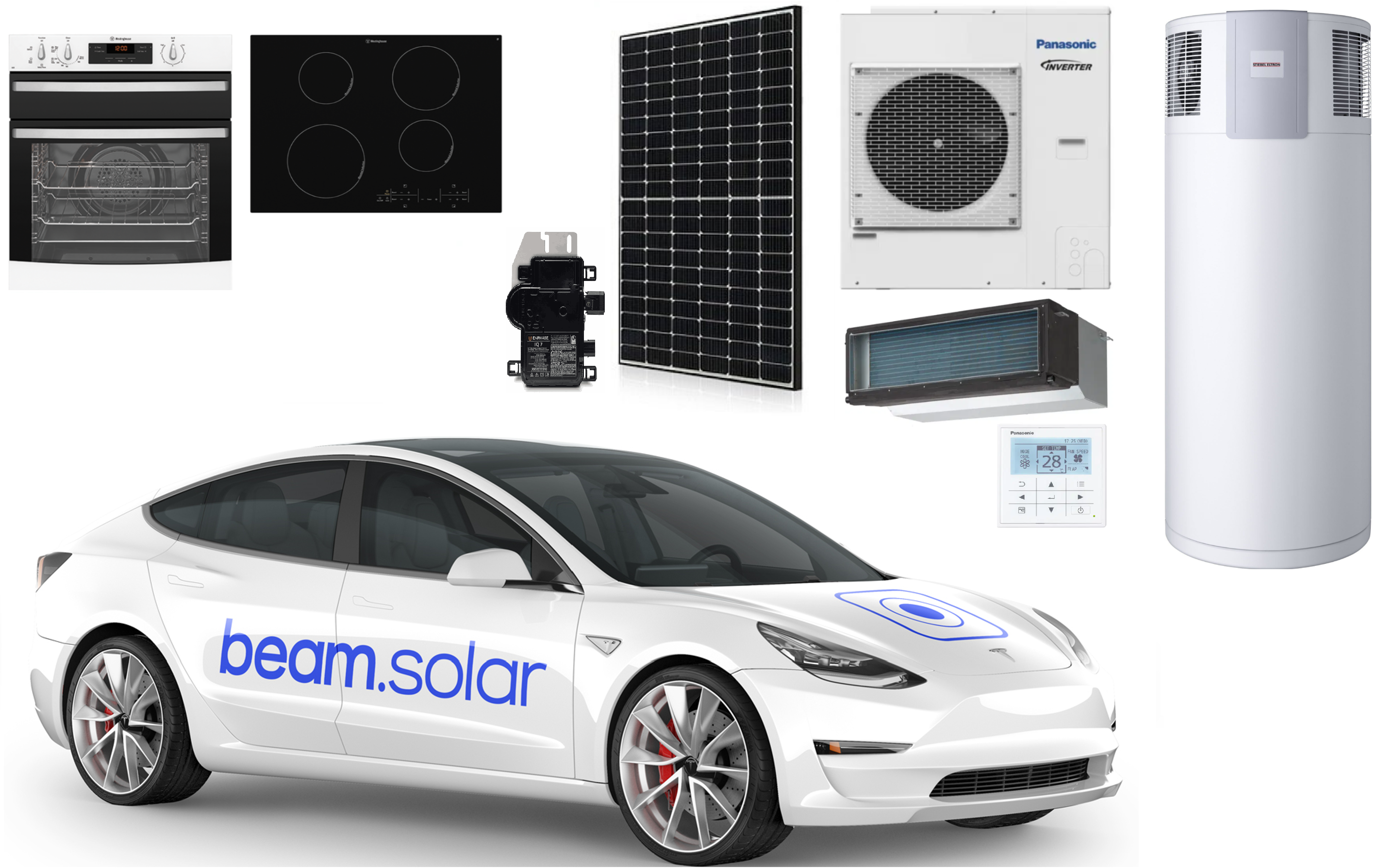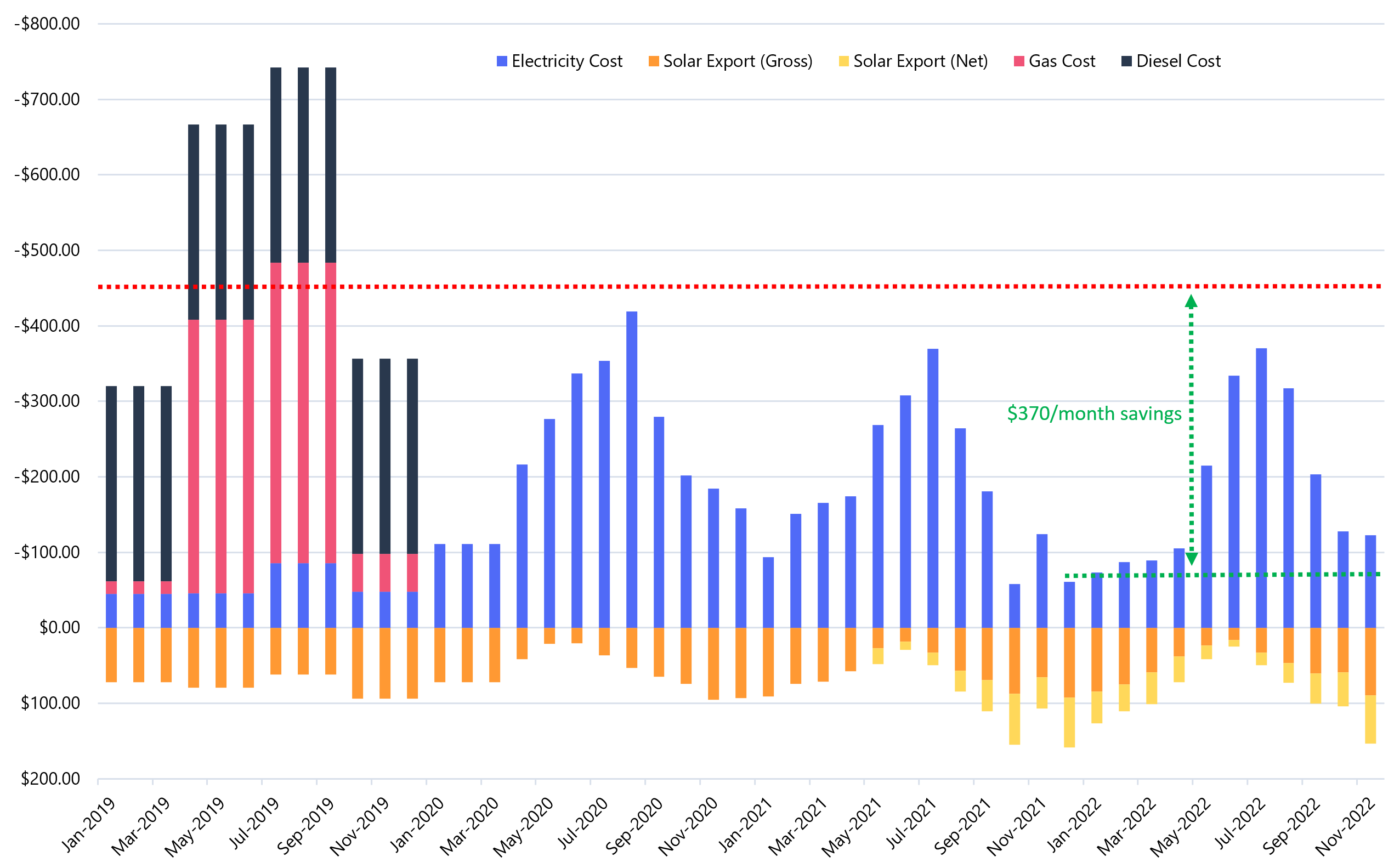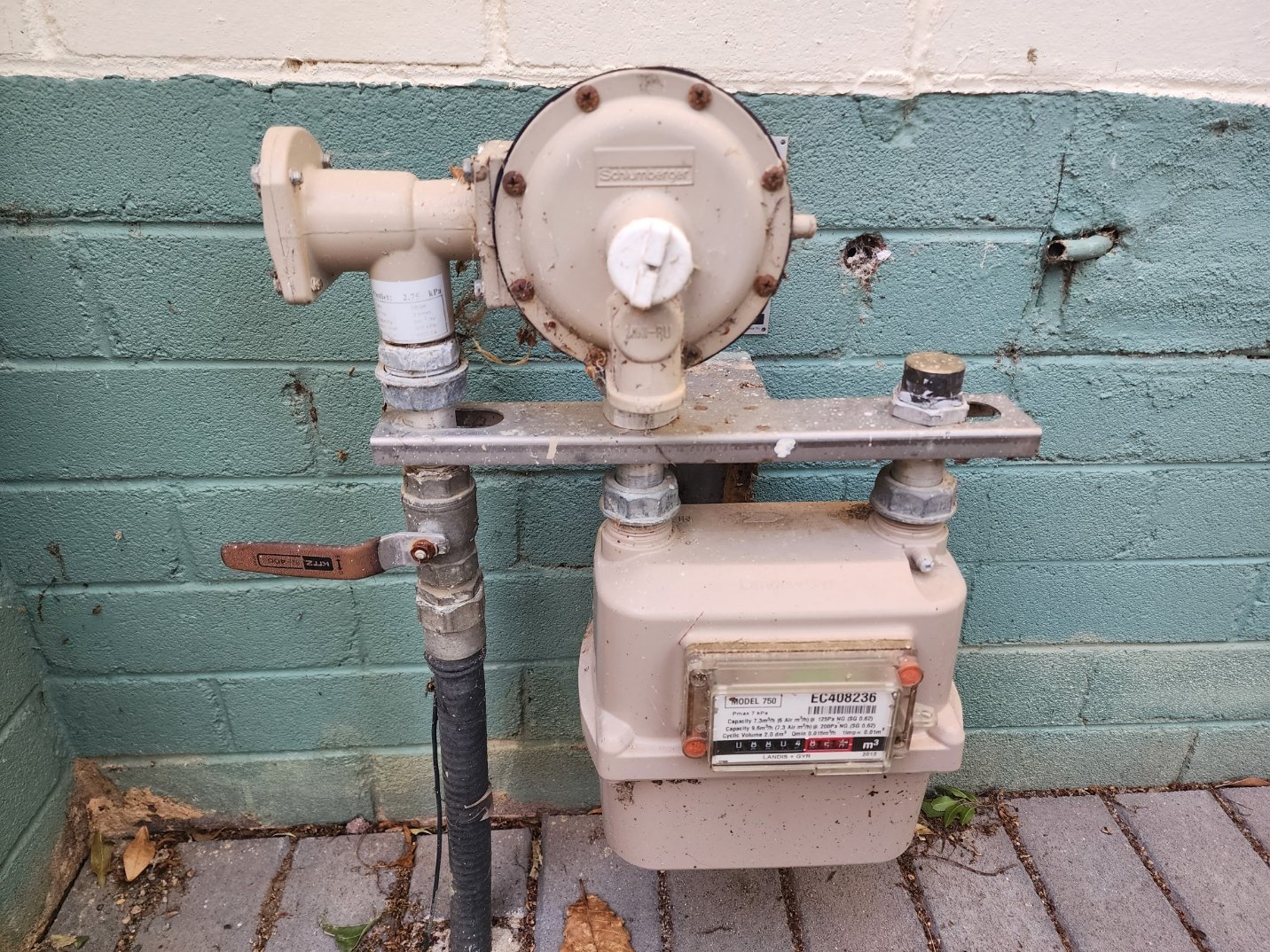Earlier in the year I wrote a blog post on how to electrify your home based on my experience doing just that in Canberra. This was a bit of an intro to the topic, some reasons why you would do it, and a look at the changes in energy flows from electrifying everything. In this blog we're going to dive into the economics of the switch to all-electric.
What did it cost and how much did we save?
$95,000 investment for $4,500 annual savings = 20 year payback.
Whoa, this payback is a lot longer that I expected! With skyrocketing energy prices I thought this would be a huge financial win, however it turns out it's not that clear cut. Let's get into the detail and find out what's going on....
Investment
First, the investment: The $95,000 investment got us everything you see in the picture - supplied, installed and disposal of the old unit where applicable.

Although reported as a straight $95k investment, the car was financed over 5 years (at a very low rate) so the actual up front investment was closer to $30k before some rebates for air conditioning and hot water, which is much more manageable. Here are the specific investment costs:
- Induction cooktop and electric oven - $4,000
- Ducted reverse cycle air conditioning - $10,000
- Heat pump hot water unit - $5,000
- Tesla Model 3 SR+ - $65,000 (financed $1,300/month x 5 years)
- 9 kW LG + Enphase solar system - $11,000
There's one other major cost item that is not included in the total - Double glazed windows. We had these installed some time in 2020 at a cost of $45k and they have undoubtedly reduced our energy costs compared to our old windows, as well as improving the comfort and noise levels of the house. The reason they are not included in the cost is basically to make the maths easy. In 2019, my partner I went to work each day in an office, switching off the winter heating as we left the house. Like a lot of people, we started working from home when COVID hit, and we now keep the heating at a toasty 20°C throughout the day. Instead of trying to quantify the extra cost of this heating, I've just assumed it will roughly cancel out the benefit of double glazed windows over the year.
Savings
To estimate savings, I have taken a measurement and verification approach, with 2019 being the 'Baseline' period, before we had made any changes, and 2022 (Dec 2021 - Nov 2022) being the 'Operating' period once we had electrified everything. Energy prices were kept level for both periods so a fair comparison could be made. During 2019 our total energy costs were $5,400 and this was reduced to just $1,000 in 2022, saving us $4,500 p.a. ($370/month). That's an 80% reduction in costs!!
Monthly energy costs (-) and savings (+) at our house in Watson, ACT.

Before we electrified our home, the bulk of our costs were diesel ($3,000 p.a.) and gas ($2,500 p.a.) and our electricity costs of $700 p.a. were offset by $900 of solar exports on our 'gross meter' system that was installed in 2010. Once electrified, we eliminated diesel and gas costs while, sort of as expected, our electricity costs flipped from a $200 rebate to a $1,000 p.a. cost.
Specific equipment savings
Because we didn't individually meter each piece of equipment, the best we can do here is estimate the savings and we can't separate out the various forms of heating. But, what we have is still very useful:
- Induction cooktop, air conditioning and hot water
- Investment: $19,000
- Savings: $1,200
- Payback: 16 years
- Tesla Model 3 SR+ - $65,000 (financed $1,300/month x 5 years)
- Investment: -$65,000
- Savings: $2,200
- Payback: 30 years
- 9 kW LG & Enphase Solar system
- Investment: $-11,000
- Savings: $1,100
- Payback: 10 years
I admit, these savings aren't blowing me away! We are currently seeing two year paybacks on multi million dollar solar projects for our commercial customers so this seems pretty underwhelming. The reason I think these returns look so poor are that savings are probably being underestimated: Electricity from the grid is insanely cheap in ACT if you're a household due to the State Government's foresight to lock in cheap renewable energy a long time ago! Gas prices should probably be a lot higher than what was modelled, which was based on the rate we paid in 2019. Current prices (if not artificially suppressed for consumers) are likely double what we were paying back then. And, car servicing costs weren't factored in - these have been zero for the Tesla but would have been many hundred dollars for the diesel Hyundai.
The verdict
If I had the money again, I would hands down spend it electrifying everything again, for these reasons:
- Although a payback of 20 years seems long, it is likely much better than that and certainly an improvement on what we would have earned with the money in the bank.
- There are many other non-financial benefits as discussed in earlier that can't be quantified: warm home, easier cooking and a state-of-the-art vehicle.
- Safety is undoubtedly improved by a wide margin with our electrified home: The car is one of the safest on the road and there's no exhaust fumes to worry about. The induction cooktop won't start a fire and our water and space heating systems don't have any open flames to worry about.
- Best of all, is what they call on South Park the 'cloud of smug'.
- It's knowing emissions have been significantly reduced! (more on that next blog)
- It's that feeling you get when your power company sends you a credit rather than a bill and transfers money into your account!
- It's the big middle finger to the gas companies when you turn off the gas valve!

Electrifying your home is hard. We've started building an app to help home owners do this, starting with solar and batteries now, and we hope to have heat pumps, air conditioning and EV charges on there shortly too. We are running a pilot of our app in Canberra so if you're interested please check it out - all feedback welcomed.
